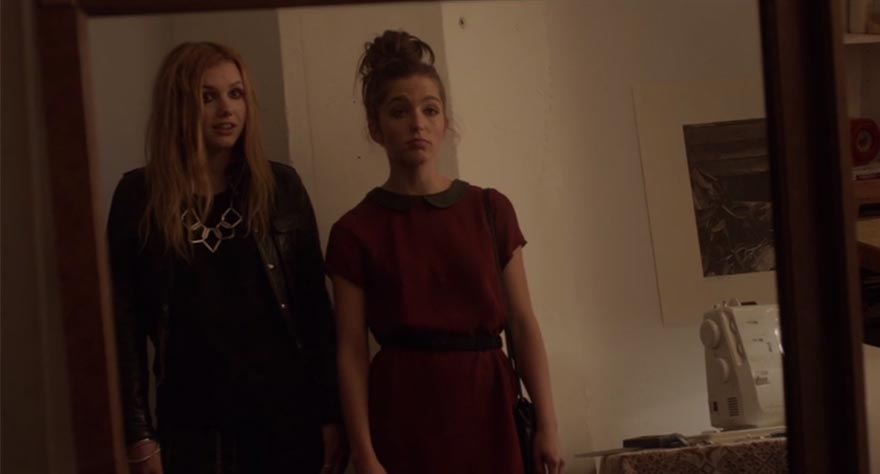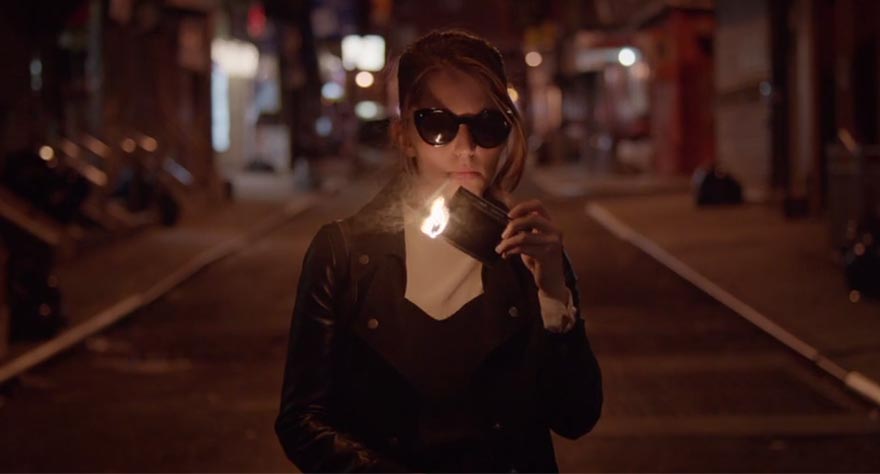
A film about two post-grad girlfriends that equates to one big selfie.

A film about two post-grad girlfriends that equates to one big selfie.
Mance Media sure knows how to pick ’em lately. The distribution company has said publicly they’re looking for films geared toward the millennial generation. Last year’s The Toy Soldiers wasn’t quite there and was mostly denounced by critics (if not our own). Upcoming in July is The Young Kieslowski, which premiered at last year’s LA Film Festival, and is another new-adult dramedy with all the ingredients and under-baked results. Their upcoming film, The Rumperbutts, similarly sounds unimpressive. Knowing all of this, I probably should have lowered my expectations for Lily & Kat, the debut feature from Micael Preysler, written by himself and Megan Platts. Starring Game of Thrones’ Hannah Murray and Jessica Rothe (who’s done a variety of TV and shorts), the film—in theory—falls squarely within Mance Media’s millennial parameters as it follows two recent fashion school grads as they get through life and love and deal with the impending reality that they won’t always have each other. The problem is that Lily & Kat feels like the film equivalent of a selfie binge session, forcing bored audiences to watch every negative millennial trait sociologists have spouted on about without introducing any of this generation’s more positive attributes—of which I believe there are plenty.
The film focuses on Rothe’s Lily, a fashion grad working for a boutique fashion designer whose scarce store includes gray walls and minimalistic all-black clothing. Lily deals with her droll day-job, obnoxiously nosy co-worker (whose breakdown of Lily’s bad evening the night before based entirely on social media clues is one of the few amusing moments of the film), and cheating non-boyfriend by turning to her best friend and partner in crime, Kat, played by Murray and her—at least in this instance—rather grating Bristolian accent. Outwardly the two appear co-dependent, but from our vantage point through Lily, it feels rather one-sided. That impression only further perpetuated by the unexpected news that Kat will be moving back to England within a week to go to grad school. Kat is the more rash and impulsive of the duo, but the news—given to an entire dinner party, no less—hits Lily square in the chest. Her response, immaturely, is to simply be secretly mad at Kat.
When Lily meets a hot artist, Henri (Jack Falahee), she finds a new distraction from the hurt of Kat’s move and the stacking frustrations in her life. Of course, the effervescent Kat complicates things by being a little too present in Lily’s attempts to put the moves on Henri, leading to a farfetched and rather wretched ending. Strike one against Preysler’s script, and reason number one why forming any attachment to either lead character is impossible, lies in these two women’s complete inability to be even half-way decent friends to one another.
Scenes of Lily being interviewed by some faceless person (maybe herself?) in a white room serve as a sort of unnecessary inner dialogue Lily has with her subconscious. It’s an amateur element and one that only furthers our disdain for Lily as she either refuses to face her own insecurities or reveals things about herself that make her more unlikable. Not to mention the two girls’ backhanded comments to one another, their chemistry-less interactions, and their obvious enablement and yet increased judgement of one another. All examples of how frenemies operate and not at all reminiscent of the tight bonds one forms in their early 20’s. Perhaps there has been more of an interest in films and TV shows around twenty-something female friendships of late because women are marrying later and those friendships and roommates are the new relationship of choice, serving as they do a more meaningful connection. Which is great, and makes for engaging and thoughtful dynamics (see Frances Ha), except that in this case it seems clear Preysler has never met a healthy female duo, nor observed the intriguing bond they are capable of. Preysler’s examples of female bonding include affirming each other’s fashion choices and “fuck-ability,” and generally being catty and uncommunicative.

That’s only the biggest offense of Preysler’s half-hearted attempt at assessing his own generation. He also touches on art, which Henri eye-rollingly refers to as beautiful “if [it] has meaning,” as though the personal meaning an artist places in his own work is easily transferable to a viewer. One can only conjecture we’re meant to apply this same statute to this film, whereby any criticism must be the fault of the critic not understanding the meaning. Then I admit it, I don’t get it.
As filler, the film is interspersed with multiple scenes of the girls getting dressed, or walking down Manhattan streets in slow motion, music pulsing, hair flowing. They come across like fashion commercials and only perpetuate the narcissistic feel of the film. Todd Antonio Somodevilla’s cinematography, bokeh littering the shallow depth of field of each nighttime scene, inadvertently creates the perfect metaphor for these girls: sparkly distractions in their shortsighted world. The music, by dance/electronic artist Glowbug, is fun but can’t make up for a lack of substance. It’s also misused in many of Preysler’s slow-moving shots and is outright laughable during a scene where Lily inspects ridiculous-looking artwork in slow motion as though this maneuver alone could infuse some more of that so-called “meaning” Preysler wants us to see. The scene feels as fake as Lily’s interest in Henri’s artwork and is made more silly when Henri goes on to demean Lily’s own lack of a true fashion career, perpetuating that popular modern movie-myth that anyone by aged 22 has found satisfaction and a sense of purpose in their career.
Lily & Kat isn’t even surface-level enjoyable. Given very little reason to root for the main character Lily, especially as we watch this young women continue to act irrationally and be a generally vapid and uninteresting character, the end has us rather rooting for the demise of her one-dimensional friendship with Kat. At one point Lily says defensively, “I think I’ve made some pretty bold choices with my life,” as though she’s done anything so far other than choose a college to go to and which men to sleep with (which actually, on at least two occasions in the film hardly seem like choices she’s making for herself). One thing millennials like are proper renditions of themselves, heck, that’s sort of a human trait, and Preysler seems to have disregarded his instincts and decided to make a film about millennials if one was to use only their snapchats, Facebook updates, and Instagram-ed head shots. Which, as it turns out, makes for a film hardly worth wasting 140 characters on.